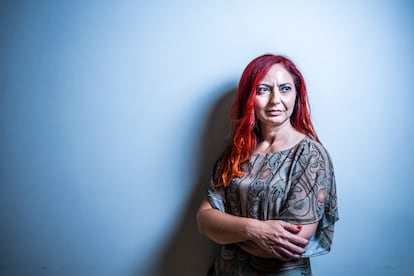Lina Khatib: ‘The Hamas attack has wide support among Palestinians’
The director of the SOAS Middle East Institute says that the Palestinian militia does not have the capacity to act without the support of Iran

Lina Khatib was born and raised in Beirut. Her parents still live in Lebanon and while she keeps abreast of developments in the land of her birth, she makes it clear that she now works and lives in London. Khatib is one of the most respected voices in Middle Eastern studies and analysis as director of the SOAS Middle East Institute in the British capital and previously served as director of the Middle East and North Africa programme at Chatham House and director of the Carnegie Middle East Center at the Carnegie Endowment for International Peace.
The professor, essayist and commentator spoke to EL PAÍS at the Casa Árabe cultural center in Madrid as part of EuroMeSCo network seminar organized by the European Institute of the Mediterranean. “My own interpretation is that it’s unlikely that Lebanon will become another front in this war,” she says of the conflict in Israel. “Hezbollah knows that it’s expected to be seen as reacting, and it has done that through launching rockets from southern Lebanon into Israel. But I don’t think it’s likely that Hezbollah is going to widen the scale of its engagement [in the Hamas offensive].
Question. The attack on Israel launched on Saturday was of tremendous magnitude. Is Hamas solely responsible?
Answer. When it comes to the Palestinian side, Hamas is definitely the main actor in this attack, with some involvement of Islamic Jihad, which is another group backed by Iran in Palestinian territory, in Gaza in particular. But Hamas is the main actor. When it comes to the geopolitical context, Hamas is supported by Iran, like Islamic Jihad and Hezbollah. And therefore, when it comes to who provided the funding, the training, the equipment to Hamas, Iran is the key player here alongside Hezbollah.
Hezbollah has a longer history and it has been helping Hamas with military coordination and training and equipment for several years. Hamas is not acting in isolation from this Iranian support
Q. So without Iranian assistance, would such an offensive be conceivable?
A. Without Iranian resources, Hamas would not have the military equipment or the training or the funding that it has, all of which have enabled this attack. But I think we should distinguish between Iran ordering this attack and Hamas obeying, and Hamas wanting to conduct an attack and Iran agreeing and supporting it. This is not an attack that Tehran ordered and Hamas executed. This is an attack that Hamas has planned and executed in partnership with Iran and Hezbollah.
Q. What is the objective of the Hamas operation?
A. The main one is political. This is not an operation that is meant to cause instability in Israel for a short period of time. This is meant to be a political game changer for Hamas. And this has two levels. One is domestic and one is international. At the domestic level, through this attack, Hamas wants to show that the Palestinian Authority, which is ultimately a political rival, is weak and does not represent the voices of Palestinians. Second, on a geopolitical level, Hamas wants to be seen internationally as the only legitimate interlocutor for Palestinians. And with this, Iran also wants to increase its own regional standing by showing that it is an agenda-setter in the geopolitics of the region. So that no solution to the Palestine-Israel conflict would happen without the international community negotiating with Iran at the geopolitical level and negotiating with Hamas at the Palestinian level.
Q. What is the breeding ground to explain why this is happening now?
A. In recent months in the relationship between Palestinians and Israelis, there has been a lot of tension, a lot of violence, especially by Israeli forces against Palestinians, not just in Gaza, but even outside, including in Jerusalem. And this has caused increasing anger among the Palestinian population. And Hamas has harnessed this anger by presenting itself as doing something to end this situation. This is why Hamas’ attack has wide support among Palestinians, even among those who traditionally would not necessarily support Hamas.
At the geopolitical level, talks between Saudi Arabia, Israel and the United States have been stepped up in recent months, involving the Palestinian Authority, to broker a deal between these actors. This deal would have brought some security guarantees for Saudi Arabia and would have presented some sort of solution for the Palestinian-Israeli conflict, but involving the Palestinian Authority as the decision-maker in whatever the solution is. Of course, Hamas has been excluded from these talks. And as these talks gain momentum, Hamas finds itself at risk of being politically irrelevant or excluded, and therefore it wants to assert itself politically at the international level.

Q. The hardest thing to explain is the lack of foresight and intelligence in Israel.
A. More and more reports are coming out about how Hamas prepared for the campaign militarily, the training they did. And yet Israel did not see this coming. Perhaps there wasn’t enough coordination within Israel between, for example, the Mossad and other elements of the Ministry of Interior and the army. Perhaps political divisions in Israel might have played a role in this lack of coordination. And when you have lack of coordination in this way, certain things are missed in a complex scenario like this one. And even U.S. intelligence did not see this coming. But I think part of this is also because many in the West, including Israel, regarded the Israeli-Palestinian conflict as stagnant, that in a way it had reached a stalemate, that it was something low-intensity brewing in the background. No one was really expecting Hamas to act at this high level in terms of a military campaign against Israel.
Q. What will it cost Israeli Prime Minister Benjamin Netanyahu?
A. Netanyahu in many ways contributed to this attack because of the behavior of the extreme right government that he leads, where he put an extremist in charge of the Ministry of Interior. Netanyahu, at the same time, is facing a court case and needs to be in power. Otherwise, he could end up in prison. Being in power gives him immunity and, therefore, it is important for Netanyahu to stay in power so that he does not end up imprisoned for corruption, were he to be convicted. That is why he has involved other leaders from rival political parties to form an emergency war government, which is a kind of coalition between him, [Benny] Gantz and [Yair] Lapid, so that he is not politically isolated.
Israel loses face if it is seen by its own citizens as being weak in the face of Hamas, and that’s another reason why Netanyahu wants to show that he is firm in his response. And that is why the Israeli Army has announced a full siege of Gaza. I think this falls short of full ground invasion, because that would come at a very high cost for Israel as well as Palestinian citizens. But a siege, of course, has high costs, mainly for Palestinian citizens.
Q. Unfortunately, we will see a tremendous cost for the Palestinian people, a lot of casualties. Do you think that Hamas has the support of Palestinian society to keep on attacking Israel?
A. The situation in Gaza is inhumane. It has been described by many, including myself, as in effect an open-air prison. You have a siege that has been in place for two decades or so, a situation in which people have nowhere to go, so it becomes very densely populated and people have very few means to make a living. These people feel desperate and that they have very few options. And if a military campaign, even at high price, means a change in the status quo, then a lot of people will be willing to make that sacrifice.
Q. Will the Abraham Accords reached by Israel with other Arab countries affect the region’s response to escalating violence?
A. The Abraham Accords were not really about Israel-Palestine. They were about the relationship between the different Arab countries that signed the Accords and Israel. It was never meant to be a solution for the Palestine-Israel conflict. But you have other actors who have been very much involved in trying to bring this conflict to a resolution, namely Egypt, Jordan and Saudi Arabia. Saudi Arabia has maintained that it remains committed to the terms of the Arab Peace Initiative, which says there has to be a two-state solution. And it reiterated this position in its response to the attacks. Saudi Arabia, Jordan and Egypt also said that they will seek to meet and try to find a way out of this conflict. The Arab countries that have traditionally been involved remain the ones involved. This conflict has not changed who among the Arab countries wants to be seen as playing a mediation and a peace-brokering role in the conflict. But one thing is clear. This attack makes it very difficult for Saudi Arabia to move ahead with its plan to talk to Israel, the United States, and the Palestinian Authority about a potential solution.
Sign up for our weekly newsletter to get more English-language news coverage from EL PAÍS USA Edition
Tu suscripción se está usando en otro dispositivo
¿Quieres añadir otro usuario a tu suscripción?
Si continúas leyendo en este dispositivo, no se podrá leer en el otro.
FlechaTu suscripción se está usando en otro dispositivo y solo puedes acceder a EL PAÍS desde un dispositivo a la vez.
Si quieres compartir tu cuenta, cambia tu suscripción a la modalidad Premium, así podrás añadir otro usuario. Cada uno accederá con su propia cuenta de email, lo que os permitirá personalizar vuestra experiencia en EL PAÍS.
¿Tienes una suscripción de empresa? Accede aquí para contratar más cuentas.
En el caso de no saber quién está usando tu cuenta, te recomendamos cambiar tu contraseña aquí.
Si decides continuar compartiendo tu cuenta, este mensaje se mostrará en tu dispositivo y en el de la otra persona que está usando tu cuenta de forma indefinida, afectando a tu experiencia de lectura. Puedes consultar aquí los términos y condiciones de la suscripción digital.









































